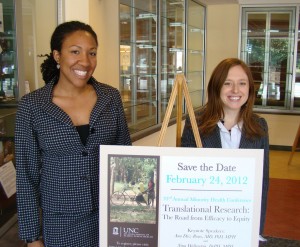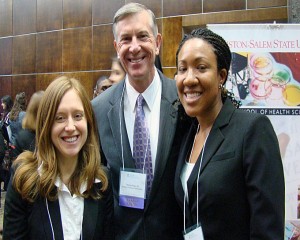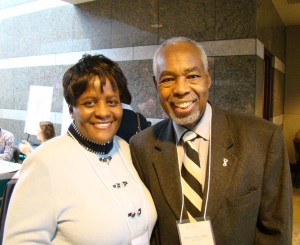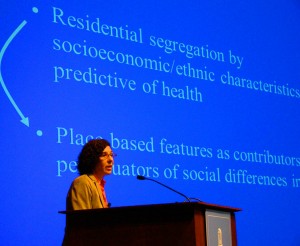Related Posts
Student-led Minority Health Conference a huge success–again!

Minority Health Conference Co-chairs Turquoise Griffith and Kea Turner with the conference poster (Photo credit: Linda Kastleman)
Since 1977, students at the UNC Gillings School of Global Public Health have coordinated the Minority Health Conference each February. February 24th was number 33. This year was the best— more than 700 people were present in Chapel Hill, and about the same number watched the keynote address at multiple locations in U.S., as well as Argentina and Belgium, through webcast. When I walked into the Friday Center and saw hundreds of people in animated conversation, I was proud and excited. It’s a real feat to select a compelling theme (This year’s was Translational Research: The Road from Efficacy to Equity.), identify and invite speakers, promote event and plan all the logistics associated with a meeting of this scope, the largest student-led health conference in the country. Minority Student Caucus conference co-chairs Kea Turner and Turquoise Griffith, both students in Health Behavior did a fabulous job!
UNC-system President Thomas Ross, JD, gave a perfect welcome. He said great things about our School and highlighted salience of the issues being addressed at the conference. I also was impressed by Vice Provost for Diversity and Multicultural Affairs, Taffye Clayton, EdD, who talked about problems of health disparities and the need for this conference. There’s an art to giving a good welcome, and I appreciate people who take the time to tailor a welcome to the specific audience. Both President Ross and Dr. Clayton gave excellent welcomes.
When it was my turn, I thanked a number of people, including Turquoise and Kea, and recognized some of the people who had started the conference and continued to provide support and inspiration for it, like Bill Jenkins, PhD, MPH, William T. Small, Jr., MSPH, Dorothy Browne, DrPH, and Vic Schoenbach, PhD.
The conference theme addressed one of the most important challenges facing the world today—translating clinical and other health discoveries so they benefit people everywhere, regardless of race, ethnicity, sexual orientation, gender or any other characteristics. It boils down to this: the failure to translate kills. When people don’t get appropriate care, because they are poor, minority, older or disadvantaged, they are more likely to contract and die from diseases that are preventable and/or treatable. This is unacceptable, and we should not tolerate it.
Keynote speaker Anna Diez-Roux, MD, PhD, MPH, from University of Michigan, is professor of epidemiology and director of a Center for Social Epidemiology and Population Health, She gave a brilliant lecture titled Neighborhoods and health disparities: old evidence and new directions. She spoke about how neighborhood contexts may impact health and contribute to health disparities
Dr. Diez-Roux made this complex topic extremely accessible. Place matters. Place, where people live and work, can be a critical factor affecting their health risks and health conditions. Recent experimental research shows that when people are offered vouchers and move from one location to another, their health risks may decrease. She also discussed new tools, like agent-based modeling, that lets scientists take multivariable problems and subject them to simulations so they can break problems down in ways that wouldn’t be possible in human experiments. She highlighted the need to generate knowledge and evidence for action. It was a cool, fascinating talk.



